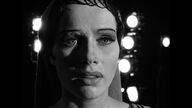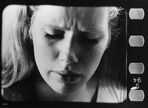Liv Ullmann plays a beautiful and charming actress Vogler, who suddenly became speechless during the filming, and since then refused to speak. He was finally admitted to a mental hospital and was taken care of by nurse Alma, played by Bibi Anderson.
Two women, one with long hair and one with short hair, have the same beautiful faces. Alma is optimistic, positive, energetic and energetic; Vogler is silent, composed, indifferent to emotions and anger, only occasionally responding with a faint smile. Alma said that no one in life wanted to listen to her, so Vogler became the best listener. At the beginning, Alma was always so happy to share everything in her life with Vogler. Slowly, she and Vogler established a delicate relationship of trust, and gradually opened up a heart that had not been opened for many years, and confessed to Vogler. It recounted a period of indulgence and waywardness of youth, and revealed the fragility and pain hidden under his cheerful and innocent face. That night, Alma dreamed that Vogler walked into her room, and the faces of the two people leaned against each other.
This is the honeymoon period between the "outside me" and the "real me". On a sunny beach with clear water and fine sand, there are only two people, Alma and Vogler, everything is so peaceful and peaceful. Under such a relaxed environment, the disguise that people have painstakingly managed has gradually become heavy and useless. While Alma told Vogler, he was also telling herself: He was treating Vogler while also healing herself. Her disguise was removed little by little in this process, and at the same time she approached her soul step by step.
Unfortunately, the good times didn't last long. Curiosity prompted Alma to take a peek at Vogler's letter to her husband, and learned that Vogler saw her as an interesting subject. He was angry and his trust in Vogler collapsed like a building collapsed. She is hostile to her, questioning her, hysterical. I also wish to deepen her pain by making affection with her husband, threatening to splash her with hot water, so as not to let her inner peace. Vogler was angry and wanted to leave her. She regretted it again, chasing her and begging her for forgiveness, as if she was the patient who needed to be taken care of.
This is a typical sensitive reaction after self-exposure. When one person reveals his own secrets to another person, he will have a strong dependence on the other person and have higher expectations for the relationship between the two. If the other person cannot return with equal or greater secrets, the relationship between the two seems to be out of balance, so Alma threatens Vogler to speak. This stems from the cowardice and fear of the "outside self" when facing the "true self". It begins to face a painful choice: escape or accept. Escaping or giving up will give the "outside self" temporary and false relief, but the "true self" will shrink with it; acceptance means meeting the challenge of the "true self" and being ready to face ugly torture at any time. People complete their self-exploration in this struggling to escape and accept. Just like in the end, when Alma forced Vogler to face reality and face herself, she completed her own salvation by integrating with her pain.
Bergman's movies always have such a magical power that can force you to reflect on yourself and life. "Screaming and Whispers" and "Wild Strawberry" are all a wonderful journey of spiritual exploration. Seeing the characters in the play are like trapped beasts, fighting between the nightmare and the closure of reality, I have to look into the mirror and spy on the soul behind this mask. In fact, the script for "Mask" was completed during Bergman's illness and hospitalization. The palms pierced by iron nails, the slaughtered lambs, the deserted yard, the silhouette of the dead woman, and the little boy covered with white cloth at the beginning of the film are all phantoms that inspired Bergman’s creative consciousness during his hospitalization. They represent In addition to death and humility, the black spider symbolizes the weaving of fate. At this time, Bergman is also facing the choice of his own destiny: from now on he decides to shoot what he wants to shoot, and no longer cares whether it is accepted by the public.
So there is this "Mask" which represents self-exploration. So there is this fine piece of film frame by frame.
View more about Persona reviews










